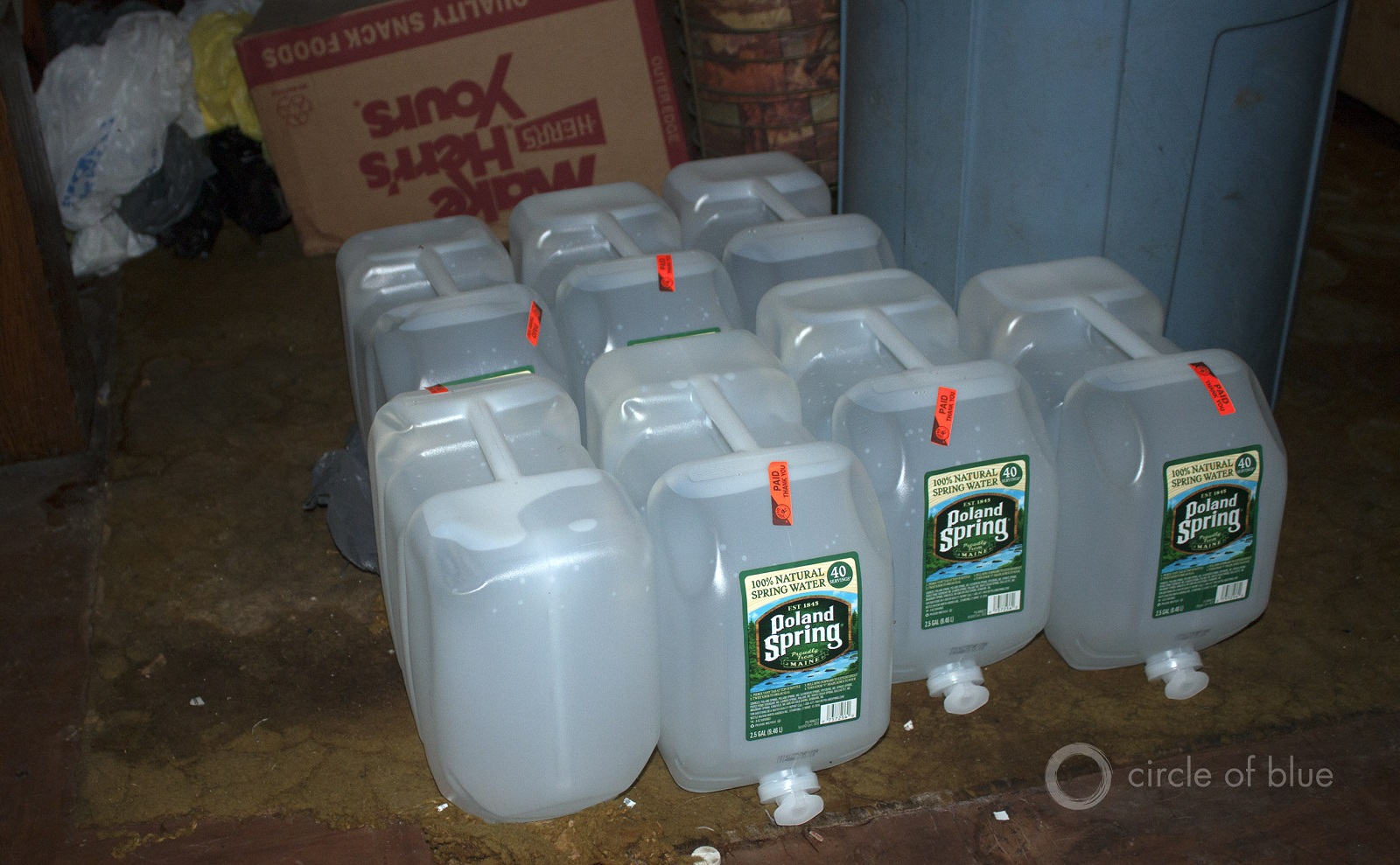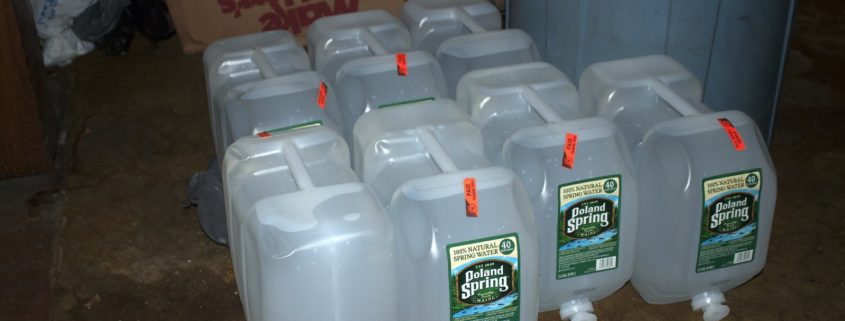A Philadelphia Story: No Running Water For Eight Years
Legal barriers block water access for residents in ‘tangled title’ cases.

Jugs of water sit in Jimmie Withers’ living room. Withers uses the water to drink, bathe, cook, wash dishes, and flush the toilet. Photo © Brett Walton / Circle of Blue
By Brett Walton, Circle of Blue
PHILADELPHIA — Jimmie Withers remembers the day his life turned upside down. It was May 16, 2009, and Withers had just visited the office of Vanessa Brown, who represents his district in the Pennsylvania House of Representatives, about a TV converter box issue. He came home to find the water turned off.
Drawn blinds darkened the south-facing living room windows of the two-story row house in West Philadelphia where Withers has lived since 1999. In mid-October the temperature outside touched 84 degrees. In the middle of the floor, seven two-and-a-half gallon jugs of Poland Spring water were arranged geometrically, like a Tetris piece. Withers, who is 64, uses this water to cook, drink, bathe, wash clothes, and flush the toilet. He’s done this for more than eight years.
“These were $3.29,” he said, referring to the cost of one jug. “Usually they’re $3.79.” He keeps an eye on advertising circulars for sales. Sometimes Acme or Fresh Grocer has the best price. These came from ShopRite. How long will the 17.5 gallons last? “Depends on how many dishes I wash — or decide to wash,” he replied.
Withers is one of thousands of Philadelphia residents whose water has been turned off. Because of poverty, regulation, and bureaucratic inertia Philadelphia is place where water shutoffs are common. According to the Philadelphia Water Department some 86,000 household accounts — one in five in the city — have had their water shut off at least once between April 2012 and April 2017, largely because of overdue bills. Most make a payment arrangement and get service restored within a few days.
But others, because their name is not on the deed to the house in which they live, fall into a legal grey area. The house might have been passed down through the family or offered by a friend, but whatever the circumstances of the exchange, the title was not properly transferred. After a shut off, getting water back on and returning to a life that most Americans take for granted can drag on much longer — years, in fact — for these tangled title cases.
Withers’ history bulges with such complexity. He rang up several thousand dollars in water payment debt when he was not working and had no other income source. He acquired the house — but not the title — from a friend after she died. For years he was caught in a tangled title limbo that, by one account, affects at least 14,000 residential properties in Philadelphia. After getting title in May and being enrolled in SSI, a federal financial aid program, he is now able and willing to pay for water, but, until a few weeks ago, was unable to connect to the system.
Rachel Lopez, a Drexel University law professor, is assisting Withers in his legal quest. She says that it is an unusually protracted and complex case, for sure. But the contours trace lines that are familiar to many other Philadelphia families who find their ability to draw water from their faucets blocked by legal particularities of property ownership and inheritance.
“Not having water for bureaucratic reasons is insane,” Lopez told Circle of Blue.
A Philadelphia Story
Like children, cities develop at different rates and in different directions when exposed to varying economic and environmental pressure. Whereas New York is a city of renters, Philadelphia, despite being the poorest large U.S. city, with a poverty rate of 26 percent, is a city of homes and homeowners.
Using U.S. Census Bureau data, the Pew Charitable Trusts found that Philadelphia’s poor households have the highest home ownership rate of the nation’s 10 largest cities, and the second-highest home ownership rate of the nation’s 10 poorest big cities, behind Miami and tied with Detroit. Roughly three in 10 poor Philadelphians own the home they live in.
Entanglements on home ownership generally happen when the title owner dies without transferring legal rights to the home and water bills are not kept current. They can also arise through a number of informal property transfer arrangements. Problems do not necessarily develop immediately, explained Kelly Gastley, a managing attorney with Philadelphia VIP, a clinic that offers free legal services to poor households.
“When everyone pays their bills and is up-to-date, there’s no problem,” Gastley told Circle of Blue. In many cases the disrupting factor does not occur for years or decades. “It’s not until they get behind in taxes or bills that it becomes very important. No one wants to talk to you unless you have title in your name.”
In Limbo
Withers is one of those residents who fell into the grey entanglement area.
Withers first moved into his house on Mantua Street in January 1999, when he was 45. He had known Vivian Lambert, the woman who had lived there, since he was a child. When he was eight years old a dog chased him onto the hood of a car, and Lambert shooed the beast away. Afterward they bonded.
“She gave me milk and cookies, and we became best of friends,” Withers recalled.

Three of the six zip codes in Philadelphia with the highest number of tangled title properties are in West Philadelphia, a predominantly black neighborhood. Photo © Brett Walton / Circle of Blue
In her later years, Lambert went to a nursing home. The family gave Withers $6,000 to live in the house and take care of it. But before he moved in vandals ripped out the pipes, not an uncommon story in Philadelphia for homes that go unoccupied for a period of time. Withers had to replumb the house before water would run.
Withers ran into financial trouble in 2006 when the woman he was living with left him, and he had no steady income. The water department turned off the water in 2009. The combination of a tangled title case that involved a deceased non-relative, little legal aid, and a debt of more than $3,000 was a formidable obstacle to reconnecting.
Without running water, his life began to move to different rhythms.
“I boil water to wash with,” he said, explaining his routine. “Then I put it in the toilet.” He’d like to do more work on the house — paint the walls, maybe, or put insulation in the back room and install new front windows and a bathtub — but when you get dirty, he said, it’s hard to get clean again. “Everything’s a cycle. You get organized after a turn because you can’t afford to waste a drop.”
Hearing his story, a local TV news station featured Withers in a segment that aired on April 8, 2016. A church donated enough bottled water to fill his living room to thigh level. The water lasted a year, he said.
Withers speaks with his eyelids lowered or closed, as if rewinding his memories and watching them on replay. But there are moments — of fury, surprise, animation — when his orbital muscles unclench and his eyes snap wide. Being asked What do you look forward to doing when you get running water? was one of those moments.
“That bathtub,” he said, answering quickly, like a student who anticipates a question.
“It’s been 18 years since I’ve been in a tub. A shower is good, good and quick. But a bathtub” — he paused and tilted his head, as if the perfection of a good soak need not be explained — “I look forward to that.”
Until he gets the tub, Withers makes do with hauling water. When he needs a resupply he takes the bus to the grocery store that has the best deal. He buys seven to 10 jugs at a time and gets a lift home from one of the people who stands outside the store and offers rides. It costs $8 to $12 to get home from ShopRite, Withers said. The other day he couldn’t get a ride so he bought only two jugs, all that he could carry alone on the bus.
Despite the inconvenience, Withers never considered leaving. He feels too indebted to Lambert’s kindness to abandon her place. Also, the house symbolizes stability for him. He had been homeless for a year and a half in the 1980s, and even though he does not have water coming through the tap, he has shelter.
Trouble, For Sure
Falling behind on water bills for entangled properties invites cascading impediments. Maintenance and connection to city services become more tenuous. Loans for home repairs are harder to acquire. Getting reconnected to water service is a chore.
The number of properties that are affected is only partly known. Philadelphia VIP attempted to estimate in 2007 the number of homes in Philadelphia that had tangled title. VIP cross-checked a database of real estate transfers between 1941 and 1977 with death records. If the last buyer was listed in the death records, a tangled title case was assumed. (If no real estate transfer had occurred since 1941, the researchers also assumed that the title owner was dead.)
The search turned up about 14,000 properties. Three of the six zip codes with the highest number of tangled title properties were in West Philadelphia, the predominantly black neighborhood where Withers lives.
Gastley acknowledges that this accounting is an underestimate because it does not tally the number of properties that are tangled by a rent-to-own agreement or forged deeds.
Access to a lawyer is an immense help in navigating the terrain of contracts and clauses. Poor households often turn to one of Philadelphia’s legal aid clinics: Community Lawyering Clinic, which is housed at Drexel and run by Lopez, Community Legal Services, with offices in North Philadelphia and Center City, and Philadelphia VIP.
Resources are limited compared to the need. Tracking down all living relatives that have a potential claim on the property and getting them to sign over their interest can take years. Gastley, who joined Philadelphia VIP in 2005 to work on tangled title, estimates that all the legal services combined take on 500 cases a year.
Gastley was not aware of any database that tracks how many tangled title cases are related to water shutoffs. Anecdotally, she said, the number could be between 10 and 15 percent of cases. Lopez said that, in cases that she has worked on, she often does not learn that a family does not have running water until months after she started. Because of embarrassment or adjustment clients do not mention it initially, she said.
Though legal advocates have made progress in the last decade, Gastley said that the task is a constant uphill push. For every title made whole, another property owner dies without the proper paperwork in place. Gastley said that she “feels confident” that the number of tangled title cases in the city is still at least 14,000.
“The issue is absolutely still out there,” she said.
Improvements in the Bureaucratic Process
In recent years, Philadelphia officials realized that they needed to begin unravel the legal knots that were preventing residents from accessing services. The City Council passed a law in 2013 that allows residents with tangled title cases to connect to water service and sign up for customer aid programs if they can prove an interest in the house.
Gastley praised the law, saying it is “an avenue for folks to get into payment and get routed to legal help.”
For households with tangled title that seek to restore water service after a shutoff, the Philadelphia Water Department lists a number of required documents. Some are needed if the title holder is alive; others if the title holder is dead. With all the right paperwork, a customer can get service even if he or she is not the title holder.
“We treat individuals that are in the process of pursing ownership as occupants if they have the appropriate documentation that proves their right to reside in the property,” Michelle Bethel, deputy revenue commissioner in charge of the Water Revenue Bureau, told Circle of Blue.
It is significantly easier to prove this with a lawyer’s help. In fact, one of the documents that the water department accepts as proof that the individual has an ownership interest is a letter from an attorney that certifies that the client has a “credible claim” and is in the process of obtaining title.
Though this is the policy, Lopez said that awareness among water department employees is thin. Law students who helped in her clinic have interacted with employees who do not know that the letter they provide can be used to establish a credible claim to the property for the client.
Without an attorney, producing this evidence, especially in cases where the title owner is dead, is vastly more challenging, Gastley and others said. Complicating the process is the water department’s inconsistency about which documents tangled title customers can use to prove they have an interest in the house.
“If there was a prescribed, public list of documentation that a potential customer could use to prove their ‘ownership interest,’ we could get more tangled title clients into occupant customer status and eligible for TAP [the customer assistance program] — without necessarily using the very limited resources of legal services or pro bono attorneys,” Gastley wrote to Circle of Blue in a follow-up email.
Josie Pickens, a lawyer at Community Legal Services, said that the water department has been willing to work with her tangled title clients to avoid shutoffs while the client gets the paperwork to prove an ownership interest.
“Our success at obtaining customer status has really been on a case by case basis,” Pickens wrote in an email to Circle of Blue. “Both sides are challenged by the really difficult cases, including cases that involve unclear ownership or missing owners.”
Bittersweet Return
Jimmie Withers’ legal fortunes turned in August 2015, when he began working with Lopez and the Community Lawyering Clinic. He heard about the clinic through a community newsletter. Lopez and her students helped track down Lambert’s son, who now lived in New Jersey. He signed over the property, as did the administrator of the estate. Withers got the title in his name last May, a year and nine months after first going to the clinic.
Then on October 20, a week and a half after Circle of Blue visited his home, the next domino fell. The water department reconnected his water service.
It should have been a jubilant occasion. Eight years, after all, with no running water. But the years had crippled his water system. “The piping is so damaged I can’t use it,” Withers explained during a phone conversation in early December. “The water heater is rotted, and water comes gushing through. It’s rusted out.”
Now he needs to figure out a way to pay for repairs. It’s frustrating, he said.
“I went through hell those eight years without water,” Withers reflected. Even with water service restored, that hell will last a little longer.
Brett writes about agriculture, energy, infrastructure, and the politics and economics of water in the United States. He also writes the Federal Water Tap, Circle of Blue’s weekly digest of U.S. government water news. He is the winner of two Society of Environmental Journalists reporting awards, one of the top honors in American environmental journalism: first place for explanatory reporting for a series on septic system pollution in the United States(2016) and third place for beat reporting in a small market (2014). He received the Sierra Club’s Distinguished Service Award in 2018. Brett lives in Seattle, where he hikes the mountains and bakes pies. Contact Brett Walton








